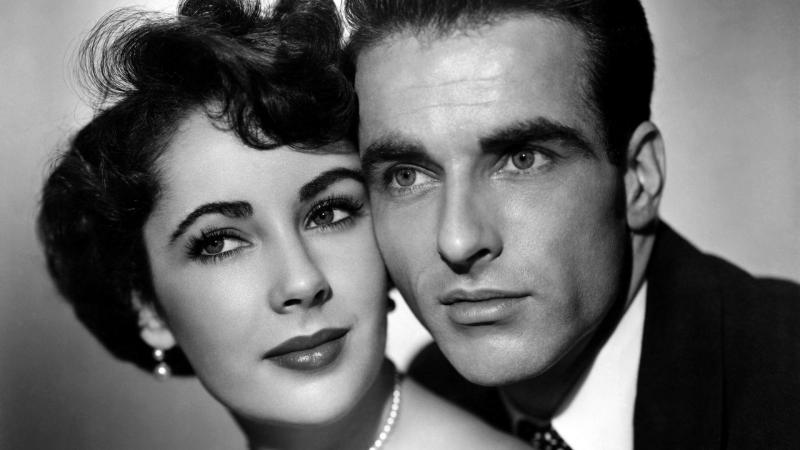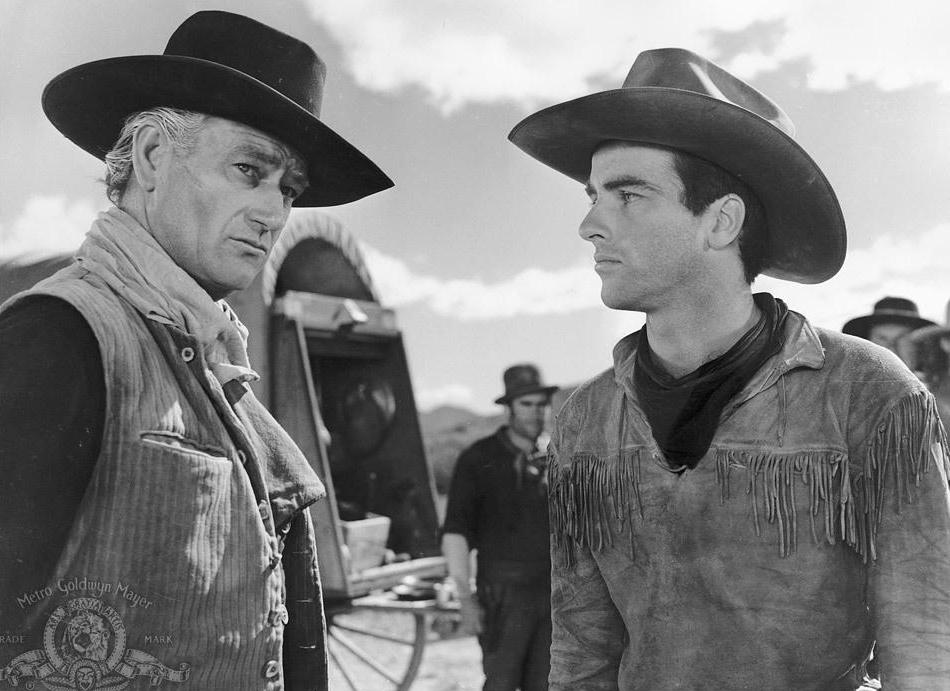Montgomery Clift: The Right Profile | reviews, news & interviews
Montgomery Clift: The Right Profile
Montgomery Clift: The Right Profile
To mark a new BFI season of his films, we reflect on the legacy of a troubled screen icon

Both on screen and off, Montgomery Clift was sensitive, hesitant, introspective, self-destructive and often tortured. A personality that expressed itself on film as if afraid of what the camera would reveal. There were at least three faces of Clift. The early public one of the dark, romantic, handsome star of the fan magazines; the face of extraordinary beauty marred after a car accident in 1956, and the private face of drink, drugs and a series of unloving homosexual encounters.
Clift emerged at the time when a new generation of actors betokened a new masculinity, unafraid to expose their most naked emotions. This was unconnected with sexual predilection, because gay actors like Rock Hudson, Tab Hunter and George Nader displayed traditional “masculine” images, while heterosexuals like Marlon Brando, Paul Newman and Warren Beatty exhibited “feminine” qualities. However, there is some likelihood that homosexuals like Clift, Tony Perkins and Sal Mineo, and the bisexual James Dean, might have found it easier to get in touch with their feelings.
Director Edward Dmytryk went out of his way to make sure that Clift was never seen in full face
As Private Prewitt in Fred Zinnemann’s From Here to Eternity (1953), Clift refuses to box for his platoon and is therefore beaten up and humiliated. In Alfred Hitchcock’s I Confess (1953), he is a priest alone with the knowledge of a murderer’s confession, refusing to betray the secrets of the confessional although he himself is accused of the crime. As George Eastman in George Stevens’ A Place In The Sun (1951), he lives with the guilt of having let his pregnant girlfriend drown, and in Lonelyhearts (1959), he is racked with guilt as the agony columnist dashing out advice to the lonely and unhappy, until he tries to get involved with the pain of the world. All are doomed heroes, loners or, like the title of one of his last films, misfits.
The motor crash occurred during the filming of Raintree County (1957), one of three pictures he made with his friend and confidante Elizabeth Taylor. A macabre game can be played by audiences while watching this sub-Gone with the Wind to try to spot the difference between those scenes shot before the crash and after. Director Edward Dmytryk went out of his way to make sure that Clift was never seen in full face.
 Clift’s first screen role was as John Wayne’s adopted son in Howard Hawks’ Red River (1948, pictured right). Hawks exploited the Freudian subtext of the script, a dual character study in which Clift’s edgy angularity was set off against Wayne’s macho security, thus creating a tension that gives this western a depth it might not otherwise have had.
Clift’s first screen role was as John Wayne’s adopted son in Howard Hawks’ Red River (1948, pictured right). Hawks exploited the Freudian subtext of the script, a dual character study in which Clift’s edgy angularity was set off against Wayne’s macho security, thus creating a tension that gives this western a depth it might not otherwise have had.
The release of Red River was delayed, so the public’s first glimpse of the 28-year-old Clift was in Zinnemann’s The Search (1948), a moving tale of a war orphan in a ravaged Berlin. Bosley Crowther in The New York Times wrote that "as the American officer who 'adopts' him, the young actor Montgomery Clift gets precisely the right combination of intensity and casualness in the role". Clift was nominated for the Best Actor Oscar, and in the year of the release of his first two movies, he was featured in a Life magazine cover story; Look magazine presented him with its Achievement Award, naming him the "most promising star on the Hollywood horizon"; and The Motion Picture Herald pronounced him "the star of tomorrow".
He did not exactly justify these plaudits in the unchallenging roles in his next two films; the dashing fortune hunter in The Heiress (1949), William Wyler’s adaptation of Henry James in which Clift coldly jilts spinster Olivia De Havilland; and as a pilot in the documentary style The Big Lift (1950) about the Berlin airlift. More complex and more satisfying was his go-getter in A Place in the Sun, with Shelley Winters and Elizabeth Taylor, all three seen in glorious close-ups. In 1953, Clift travelled to Italy to co-star with Jennifer Jones in Vittorio De Sica’s Indiscretion of an American Wife. Almost entirely set in the Rome railway station, it is a tiresome farewell between Jones as the wife and Clift as her Italian (!) lover. It was De Sica’s first use of big stars, but it did nothing for Clift’s career.
Watch Clift in A Place in the Sun
Four years away from the screen of drifting and "finding himself", ended with Raintree County and the car crash, but he continued to work after his recovery. He is convincing as the victimised Jewish soldier in Dmytryk’s The Young Lions (1958), but is little more than a catalyst, merely providing cues for Taylor and Katharine Hepburn, in Joseph Mankiewicz’s overheated Suddenly Last Summer (1959). Clift’s passivity is strangely effective as the New Deal idealist in Tennessee in Elia Kazan’s impressive Wild River (1960), and reveals more insecurity in John Huston’s symbol-laden The Misfits (scripted by Arthur Miller). Here, Clift was the unwilling roper of wild horses in a film that has the smell of death about it. (It was both Clark Gable and Marilyn Monroe’s last film.) At the same time, Clift, on the edge of a crack-up, kept phoning David Lean in Madrid almost every day begging to be allowed to play the title role in Lawrence of Arabia.
More pathos and neurosis was expressed in Clift’s last films. He was painful to watch as one of the "star" witnesses in Judgement at Nuremberg (1961), a mentally disturbed concentration camp victim, and behind whiskers, a world of meaning in his eyes, in Huston’s Freud (1962), he finds the key to a patient’s trauma by delving into his own infant sexuality. His final film before his death from a heart attack in 1966 at the age of 45, was a bleak French espionage movie called The Defector (1966), in which he once again played an anguished loner, the role he had played for most of his life.
Add comment
The future of Arts Journalism
You can stop theartsdesk.com closing!
We urgently need financing to survive. Our fundraising drive has thus far raised £49,000 but we need to reach £100,000 or we will be forced to close. Please contribute here: https://gofund.me/c3f6033d
And if you can forward this information to anyone who might assist, we’d be grateful.

Subscribe to theartsdesk.com
Thank you for continuing to read our work on theartsdesk.com. For unlimited access to every article in its entirety, including our archive of more than 15,000 pieces, we're asking for £5 per month or £40 per year. We feel it's a very good deal, and hope you do too.
To take a subscription now simply click here.
And if you're looking for that extra gift for a friend or family member, why not treat them to a theartsdesk.com gift subscription?
more Film
 Can I get a Witness? review - time to die before you get old
Ann Marie Fleming directs Sandra Oh in dystopian fantasy that fails to ignite
Can I get a Witness? review - time to die before you get old
Ann Marie Fleming directs Sandra Oh in dystopian fantasy that fails to ignite
 Happyend review - the kids are never alright
In this futuristic blackboard jungle everything is a bit too manicured
Happyend review - the kids are never alright
In this futuristic blackboard jungle everything is a bit too manicured
 Robert Redford (1936-2025)
The star was more admired within the screen trade than by the critics
Robert Redford (1936-2025)
The star was more admired within the screen trade than by the critics
 Blu-ray: The Sons of Great Bear
DEFA's first 'Red Western': a revisionist take on colonial expansion
Blu-ray: The Sons of Great Bear
DEFA's first 'Red Western': a revisionist take on colonial expansion
 Spinal Tap II: The End Continues review - comedy rock band fails to revive past glories
Belated satirical sequel runs out of gas
Spinal Tap II: The End Continues review - comedy rock band fails to revive past glories
Belated satirical sequel runs out of gas
 Downton Abbey: The Grand Finale review - an attemptedly elegiac final chapter haunted by its past
Noel Coward is a welcome visitor to the insular world of the hit series
Downton Abbey: The Grand Finale review - an attemptedly elegiac final chapter haunted by its past
Noel Coward is a welcome visitor to the insular world of the hit series
 Islands review - sunshine noir serves an ace
Sam Riley is the holiday resort tennis pro in over his head
Islands review - sunshine noir serves an ace
Sam Riley is the holiday resort tennis pro in over his head
 theartsdesk Q&A: actor Sam Riley on playing a washed-up loner in the thriller 'Islands'
The actor discusses his love of self-destructive characters and the problem with fame
theartsdesk Q&A: actor Sam Riley on playing a washed-up loner in the thriller 'Islands'
The actor discusses his love of self-destructive characters and the problem with fame
 Honey Don’t! review - film noir in the bright sun
A Coen brother with a blood-simple gumshoe caper
Honey Don’t! review - film noir in the bright sun
A Coen brother with a blood-simple gumshoe caper
 The Courageous review - Ophélia Kolb excels as a single mother on the edge
Jasmin Gordon's directorial debut features strong performances but leaves too much unexplained
The Courageous review - Ophélia Kolb excels as a single mother on the edge
Jasmin Gordon's directorial debut features strong performances but leaves too much unexplained
 Blu-ray: The Graduate
Post #MeToo, can Mike Nichols' second feature still lay claim to Classic Film status?
Blu-ray: The Graduate
Post #MeToo, can Mike Nichols' second feature still lay claim to Classic Film status?

Comments
Monty Cliff was a great
Thanks for honouring this